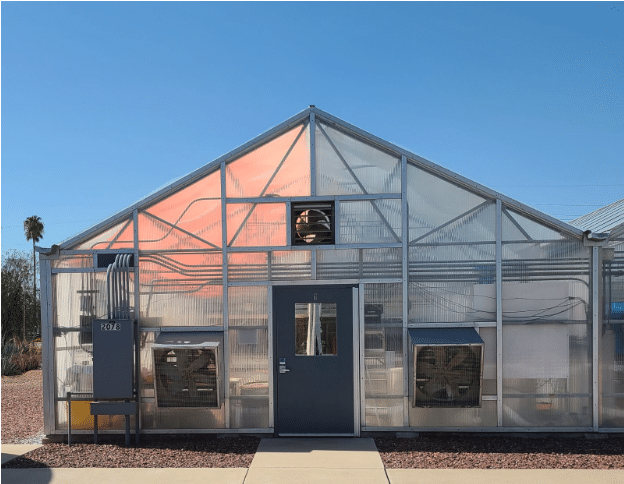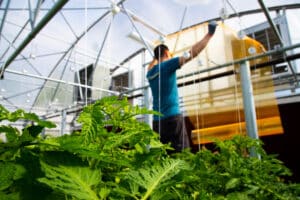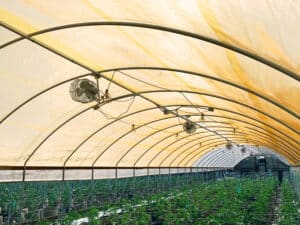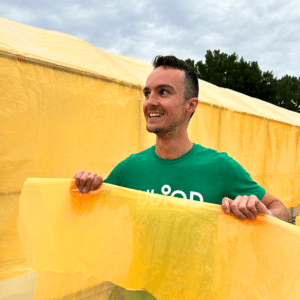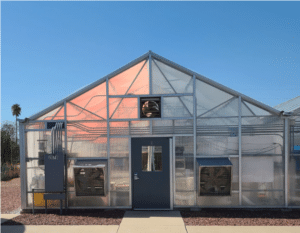
7 Common Questions About Greenhouse Coverings—Answered!
When it comes to optimizing your greenhouse, choosing the right covering is essential. Whether you’re growing leafy greens, flowers, or high-value crops, your greenhouse covering directly affects light transmission, temperature control, and overall plant health. The right covering can mean the difference between thriving crops and struggling ones.
To help growers make informed decisions, we’re answering some of the most common questions about greenhouse coverings. If you’re looking to boost your yields, save on energy costs, and create the best environment for your plants, read on!
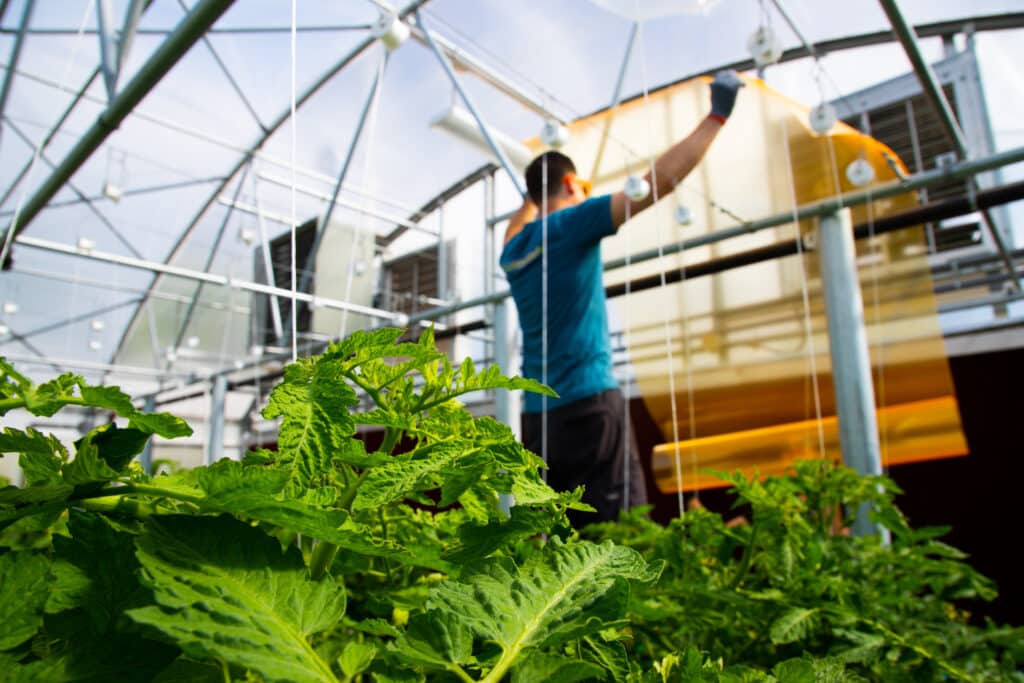
1. What Is the Best Type of Greenhouse Covering?
The best greenhouse covering depends on your specific growing needs. Common options include polycarbonate panels, polyethylene films, and glass. Polycarbonate panels are durable and provide good insulation, making them ideal for cold climates. Glass offers excellent clarity and longevity but can be expensive and fragile.
Polyethylene films, like those used with UbiGro’s advanced films, are lightweight, cost-effective, and enhance light diffusion—making them an excellent choice for maximizing growth. They also allow for easier installation and replacement compared to rigid materials. If you want a balance between affordability and effectiveness, polyethylene films are a great option.
Additionally, polyethylene films can be customized for specific agricultural applications. Some films include anti-condensation coatings to prevent water droplets from forming, while others offer enhanced UV protection to increase longevity. UbiGro’s innovative films incorporate quantum dot technology, which tailors sunlight to better suit plant growth, ultimately leading to healthier, more productive crops.
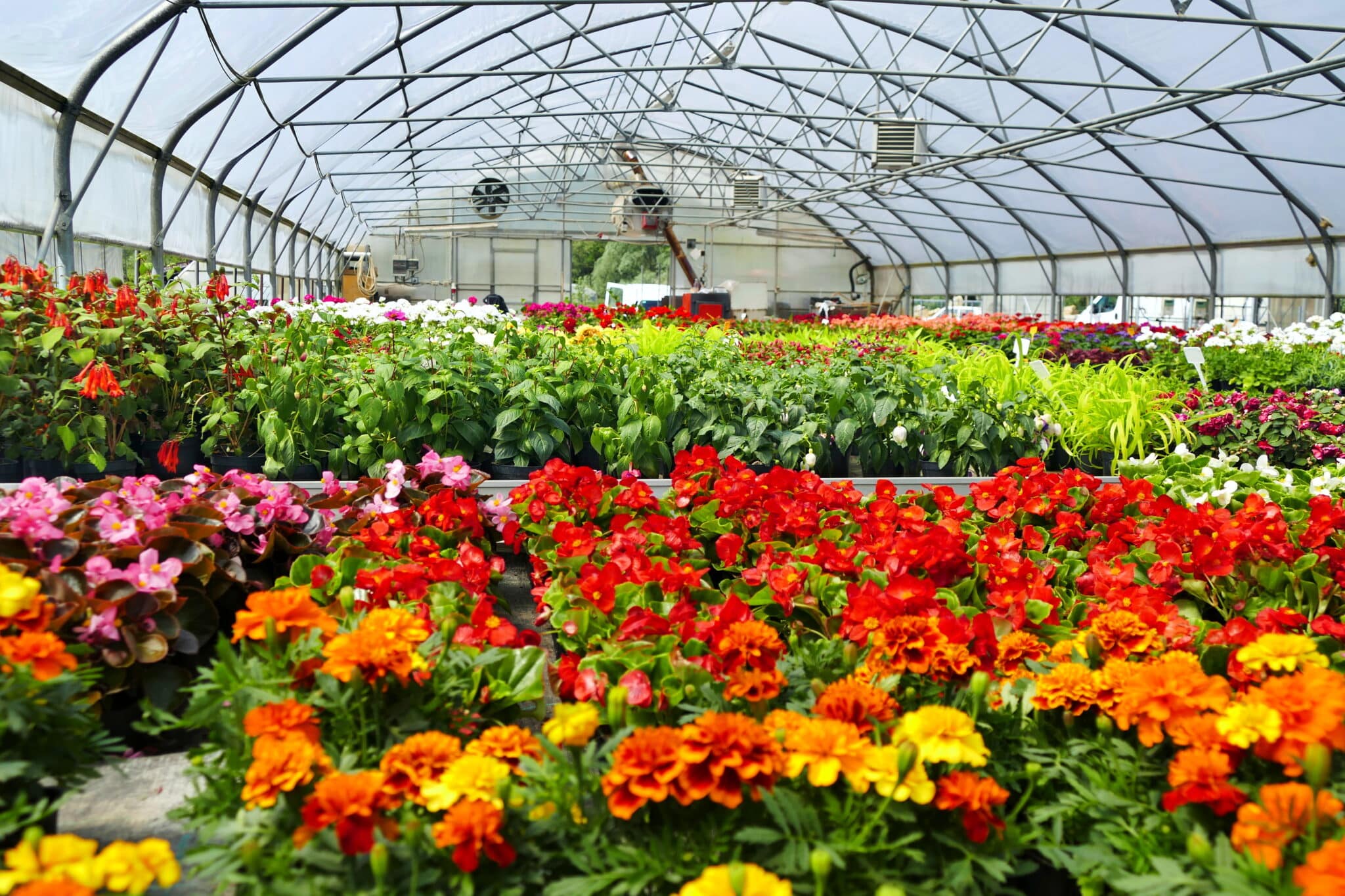
2. How Do Greenhouse Films Impact Light Quality?
Light quality is just as important as light quantity. Different light spectrums affect plant growth in various ways. UbiGro films are designed to shift sunlight into the red spectrum, which is more efficient for photosynthesis. This means your plants can grow faster and stronger, even in conditions with limited natural light.
Red light encourages flowering and fruit production, making it especially beneficial for crops like tomatoes, peppers, and strawberries. With better light optimization, you can see improvements in yield and plant health without increasing energy costs.
In addition to boosting red light, high-quality films also help diffuse light evenly throughout the greenhouse. Light diffusion reduces harsh shadows and ensures that all plants, even those on lower levels, receive adequate sunlight. This results in more uniform growth, healthier plants, and increased overall production.
3. How Long Do Greenhouse Coverings Last?
Durability varies by material and environmental conditions. Polycarbonate panels can last over 10 years, while polyethylene films typically last 3-5 years.
Regular maintenance and proper installation can extend the lifespan of any covering. Factors like UV exposure, humidity, and wind conditions can impact longevity, so it’s important to choose a covering designed to withstand your specific environment.
Greenhouse coverings that incorporate UV stabilization and anti-aging treatments last longer, maintaining their transparency and structural integrity over time. Investing in a high-quality covering can help reduce overall costs by minimizing the need for frequent replacements.
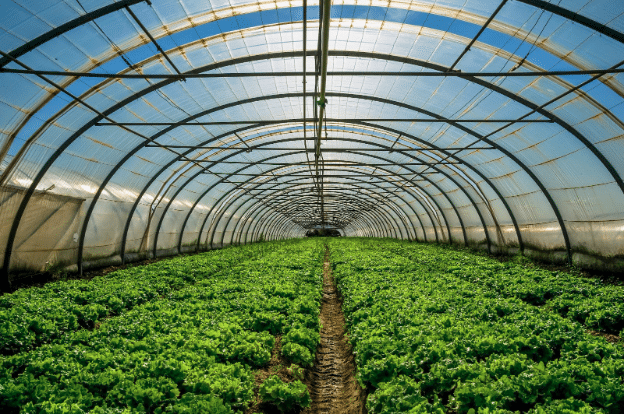
4. Can a Greenhouse Covering Help with Energy Efficiency?
Absolutely! High-quality coverings improve insulation, reducing heating and cooling costs. UbiGro’s films not only optimize light for plant growth but also help maintain a stable greenhouse climate, improving energy efficiency. By trapping heat in colder months and reflecting excess heat during warmer months, a good covering can significantly lower energy expenses. Investing in an efficient covering helps growers cut costs while maintaining an ideal growing environment year-round.
Beyond energy savings, an optimized greenhouse covering can contribute to sustainability efforts by reducing reliance on artificial lighting and heating. This not only lowers utility bills but also helps reduce a farm’s overall carbon footprint, making greenhouse operations more environmentally friendly.
5. Do Greenhouse Films Work in All Climates?
Yes, but it’s important to choose the right type. Some films are better suited for certain climates. For example, in high-humidity regions, you’ll need a film that resists condensation and mold. In dry, sunny areas, UV-resistant films will last longer and prevent damage.
UbiGro films are designed to perform in a variety of environments, from high-humidity regions to arid conditions, ensuring consistent plant benefits no matter where your greenhouse is located. This adaptability makes them a great option for growers in diverse climates.
Greenhouse operators in extreme climates often pair their coverings with additional climate control measures, such as ventilation systems and shade cloths, to fine-tune growing conditions. Combining the right greenhouse covering with strategic environmental management can lead to significantly improved plant health and productivity.
6. How Do I Maintain My Greenhouse Covering?
Regular cleaning and inspections are key. Dirt, dust, and debris can block light from reaching your plants, reducing their growth potential. Cleaning your covering with mild soap and water every few months ensures maximum light transmission.
UbiGro films are easy to clean and highly resistant to degradation, ensuring they continue to enhance plant growth year after year. Checking for tears or wear-and-tear also helps extend the life of your covering. If damage occurs, prompt patching or replacement can prevent bigger issues down the road.
To further protect your covering, avoid using harsh chemicals or abrasive tools that could scratch or weaken the material. Additionally, securing your film properly and checking for structural weaknesses in your greenhouse frame can prevent damage caused by wind, snow, or excessive tension.
7. Is UbiGro Easy to Install?
Yes! UbiGro films are designed for easy integration into existing greenhouses. Whether you’re retrofitting your structure or setting up a new one, the installation process is simple and delivers instant benefits for your crops. Many growers appreciate that they can install these films without specialized tools or professional help. With clear instructions and flexible sizing, UbiGro ensures that every grower—whether commercial or small-scale—can benefit from better light optimization without hassle.
The Bottom Line
Choosing the right greenhouse covering is a game-changer for growers. Whether you’re looking to increase yields, improve energy efficiency, or optimize light quality, UbiGro films offer an innovative solution that maximizes plant performance. By improving light distribution, enhancing photosynthesis, and maintaining a stable growing environment, UbiGro helps greenhouse operators achieve bigger, healthier harvests with less effort.
If you’re serious about improving your greenhouse’s productivity and efficiency, it’s time to make the switch. The right covering can help you grow stronger plants, extend your growing season, and reduce costs in the long run.
Want to learn more? Contact UbiGro today and see how our technology can transform your greenhouse!

Eric Moody
Eric Moody is UbiQD's Director of UbiGro Sales. Eric has more than 8 years of experience in the horticulture lighting industry, building relationships with greenhouse growers of all sizes and crops on optimal lighting for their growing operation, and most recently managed a North American sales team for PL Light Systems. Overall, Eric has been in sales leadership positions for more than 17 years. Eric brings with him a great understanding of the market and available technologies for growers, greenhouse facilities, and sales leadership.
Share:
Connect With Us
Company
Resources
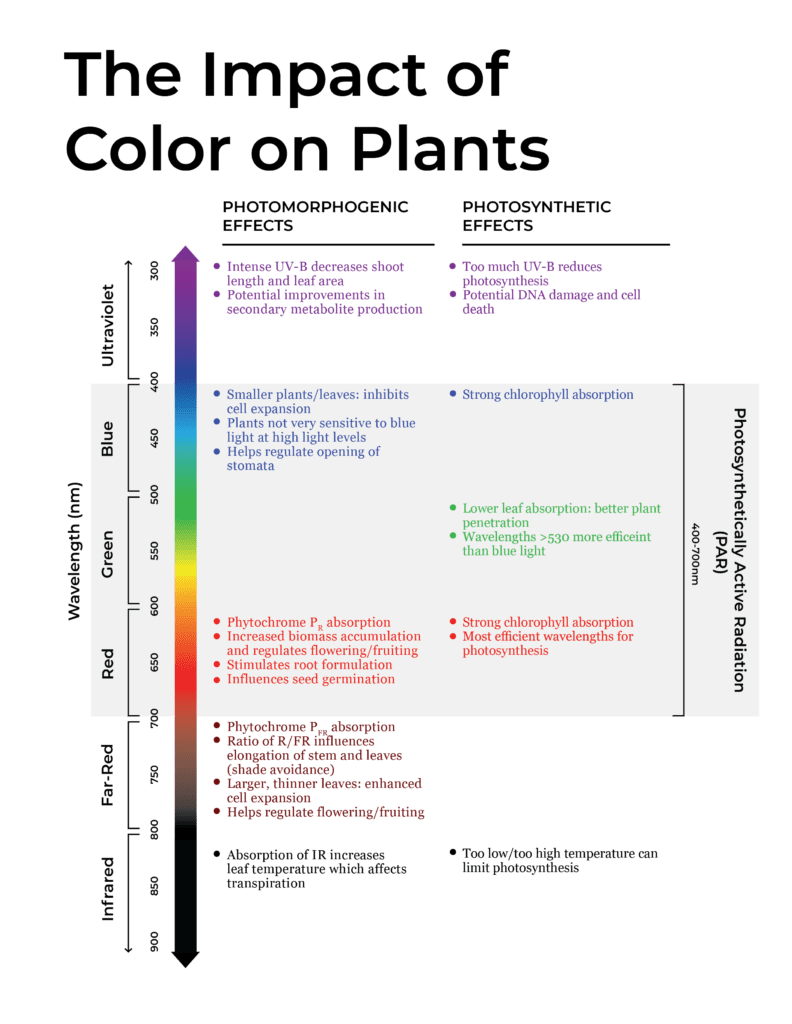

Hunter McDaniel, PhD
Founder & CEO
Hunter earned a Ph.D. in Materials Science and Engineering at the University of Illinois at Urbana-Champaign, before joining Los Alamos National Laboratory in the Chemistry Division. Ultimately the value proposition of UbiGro is about boosting crop yields and quality without the cost or energy impact of lighting. Hunter has more than fifty publications and patents, and more than 2000 total citations, h-index: 20. Hunter fundamentally believes that novel materials underpin every significant technology advancement, and he is focused on leveraging new materials to have a lasting and sustainable impact.

Damon Hebert, PhD
Director of Agriculture
Damon brings a wide range of experience in agriculture, materials science, spectroscopy, and small business. During his time in Prof. Angus Rockett’s research group at The University of Illinois at Urbana-Champaign (UIUC), Hebert authored a doctoral thesis and multiple papers on the materials science of CIGS semiconductor materials, which is closely related to the materials developed at UbiQD. He also served as a consultant to Nanosolar, a CIGS nanocrystal solar cell manufacturing company. Hebert has industry experience having co-founded Dr. Jolly’s, a leading cultivation and distribution operation in Bend, OR.

Tania Lafaille
Sales Representative
Tania is a UbiGro Sales Representative, with over 7 years of experience in product sales (specifically berries and avocados) covering all of North America and parts of South America. While in agriculture, Tania has cultivated strong relationships with growers and distributors, granting her a unique insight into both perspectives. That understanding, paired with her fierce dedication to results, drives her fun and fiery commitment to her craft. Tania is based in Gilroy, CA.

Tyler Veyna
Sales Representative
Tyler brings 15 years of experience in Greenhouse production and facility management of a wide range of crops in multiple states to the UbiGro team. Based in Salinas, California. “Being a fourth-generation farmer, I look to improve and empower the grower, and with UbiGro, we can do just that.”

Jim Gideon
Sales Manager
Jim Gideon is an UbiGro Sales Manager, with over 25 years of greenhouse industry sales experience covering all of North America. Previously Jim has worked for Green Tek, Plazit-Polygal, Texel, Cherry Creek, and Nexus. He is based in Montgomery, AL, and Jim believes that “light is everything to the grower.”

Eric Moody
Director of Sales
Eric Moody is UbiQD’s Director of UbiGro Sales. Eric has more than 6 years of experience in horticulture lighting industry, building relationships with greenhouse growers of all sizes and crops on optimal lighting for their growing operation, and most recently managed a North American sales team for PL Light Systems. Overall, Eric has been in sales leadership positions for more than 13 years. Eric brings with him a great understanding of the market and available technologies for growers, greenhouse facilities, and sales leadership. Reach Eric by phone at 541-490-6421 or by email at [email protected].

Mike Burrows, PhD
Dr. Michael Burrows is UbiQd’s Vice President of Business Development. His educational background includes a Materials Science doctorate from the University of Delaware and an MBA from Duke University Fuqua School of Business. His career has specialized in the commercialization of novel electronic materials in venture-run programs for different industries including solar, biosensors, and the automotive industry. In both start-up and corporate environments, he has extensive experience in global market development, foraging supply chain partnerships, productization, and brand building. He is currently leading UbiQD’s partnership efforts in luminescent greenhouse technology, smart windows, and security ventures.

Matt Bergern, PhD
Cheif Product Officer
As Chief Product Officer at UbiQD, Dr. Matt Bergren leads the company’s product development efforts, sales, and product manufacturing, including the company’s first commercial agriculture product, UbiGro. He plays a critical role in continuing the company’s path of technology development and vision of powering product innovations in agriculture, clean energy, and security.
He serves as the principal investigator for UbiQD’s contract with NASA, focused on tailoring the solar spectrum for enhanced crop production for space missions. Dr. Bergren’s leadership experience includes serving on the board of directors for the New Mexico Energy Manufacturing Institute, focused on job creation in New Mexico’s energy, and related manufacturing community.
